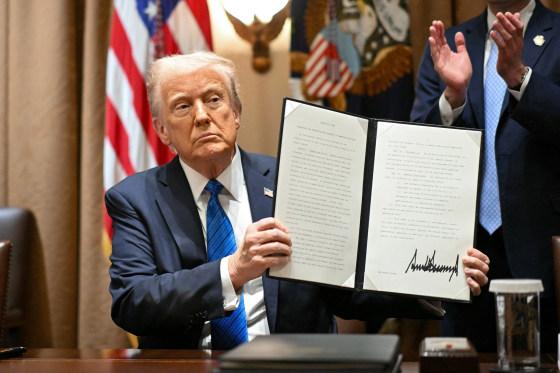A recent series of citizenship policy changes proposed under the Trump administration are raising concerns about their potential impact on Native American communities. Experts and tribal leaders warn that these orders could complicate tribal sovereignty, citizenship rights, and access to federal benefits for Native Americans. This Axios report examines the implications of the Trump citizenship orders on indigenous populations and the legal and social challenges that may arise.
Impact of Trump Citizenship Orders on Tribal Sovereignty and Legal Status
TrumpŌĆÖs citizenship orders pose a significant challenge to Native American tribal sovereignty, potentially undermining the inherent rights of tribes to govern their own affairs. By altering the criteria for citizenship and tribal membership, these directives could interfere with the tribesŌĆÖ authority to define and regulate membership, which has historically been central to their self-governance and cultural preservation. Critics argue that federal overreach threatens to weaken tribal legal status, complicating the relationship between tribes and the federal government, and potentially reducing access to resources and protections afforded to recognized tribal members.
Moreover, the orders risk creating legal ambiguity regarding citizenship status, which could lead to increased litigation and bureaucratic hurdles for Native Americans. Key concerns include:
- Conflicting definitions of who qualifies as a citizen, affecting eligibility for tribal benefits.
- Disruption of tribal enrollment processes that have been crafted and maintained by tribes themselves.
- Potential impact on federal recognition of tribes, which relies heavily on membership and governance criteria.
| Aspect | Potential Impact |
|---|---|
| Tribal Sovereignty | Reduced autonomy over membership rules |
| Legal Status | Increased federal intervention and litigation |
| Access to Benefits | Eligibility disputes for healthcare, education, and housing |
Potential Changes to Native American Access to Federal Benefits
The recent citizenship orders signed during the Trump administration have sparked concerns regarding their impact on Native American communities, particularly in terms of eligibility for federal benefits. These orders could lead to stringent verification processes that potentially exclude individuals who have traditionally qualified based on tribal affiliation and historical treaties. The implications extend to healthcare, housing, education, and social services, which many Native American families depend on for their well-being.
Experts warn that such policy shifts may challenge the sovereignty of tribal nations by imposing federal criteria over traditional enrollment standards. This could result in:
- Reduced access to programs funded under the Indian Self-Determination and Education Assistance Act
- Increased bureaucratic hurdles for tribal members to prove their citizenship status
- Potential legal disputes between tribes and federal agencies over recognition and benefits
As tribal leaders mobilize to respond, the evolving landscape underscores the necessity for carefully balancing federal oversight with respect for tribal sovereignty.
| Federal Benefit Program | Current Eligibility Basis | Potential Change Impact |
|---|---|---|
| Indian Health Service | Tribal citizenship or enrollment | Stricter citizenship verification may limit access |
| Housing Assistance | Recognition of tribal membership | Possible delays in aid distribution |
| Education Grants | Documented tribal affiliation | Increased documentation requirements |
Tribal Leaders Respond to New Citizenship Policies
Tribal leaders have voiced strong concerns over recent citizenship directives, emphasizing their potential to undermine sovereignty and the ongoing efforts to protect Native American rights. Many contend that these policies, by tightening citizenship requirements, risk marginalizing Indigenous communities who already face significant legal and bureaucratic hurdles. The National Congress of American Indians has called for immediate dialogue with federal officials to address these implications and seeks assurances that Native rights, treaties, and citizenship status will be safeguarded amid these changes.
In addition to vocal opposition, tribes are mobilizing strategies to educate their members and reinforce community legal frameworks. Their approach includes:
- Hosting informational sessions on citizenship rights and eligibility
- Collaborating with advocacy groups to monitor policy enforcement
- Pressing for legislative reviews to ensure tribal sovereignty is respected
| Tribal Nation | Primary Concern | Action Taken |
|---|---|---|
| Navajo Nation | Citizenship documentation | Legal workshops |
| Cherokee Nation | Sovereignty protection | Lobbying Congress |
| Sioux Tribes | Access to rights | Community outreach |
Strategies for Protecting Indigenous Rights Amid Policy Shifts
In the face of shifting federal policies surrounding citizenship and sovereignty, safeguarding Native American rights requires a multifaceted approach centered on legal advocacy and grassroots mobilization. Key strategies include strengthening tribal sovereignty through asserting treaty rights in courts and engaging in direct dialogue with policy makers to ensure Indigenous voices influence legislative frameworks. Equally important is expanding education and awareness campaigns about the historical and cultural significance of Native nations, which clear misconceptions and foster broader public support.
- Legal empowerment: Supporting tribal attorneys and legal organizations in challenging infringements on citizenship and land rights.
- Community engagement: Amplifying Indigenous narratives in media and public forums to counteract misinformation.
- Policy participation: Increasing Indigenous representation in government decision-making processes.
To track progress and identify areas needing attention, a simple monitoring framework can be established. This enables stakeholders to assess advocacy effectiveness and coordinate responses swiftly when federal directives threaten tribal interests.
| Strategy | Objective | Example Action |
|---|---|---|
| Legal Advocacy | Protect citizenship rights | Pursue litigation against restrictive policies |
| Public Awareness | Educate broader audiences | Launch cultural storytelling campaigns |
| Political Inclusion | Influence policy | Support Indigenous candidates |
The Conclusion
As debates continue over the implications of TrumpŌĆÖs citizenship orders, Native American communities remain vigilant about potential impacts on their sovereignty and rights. Policymakers and tribal leaders alike emphasize the need for careful consideration to ensure that any changes do not undermine established treaties or tribal citizenship criteria. The evolving legal landscape will be closely watched, with significant consequences for Native American identity and governance at stake.







